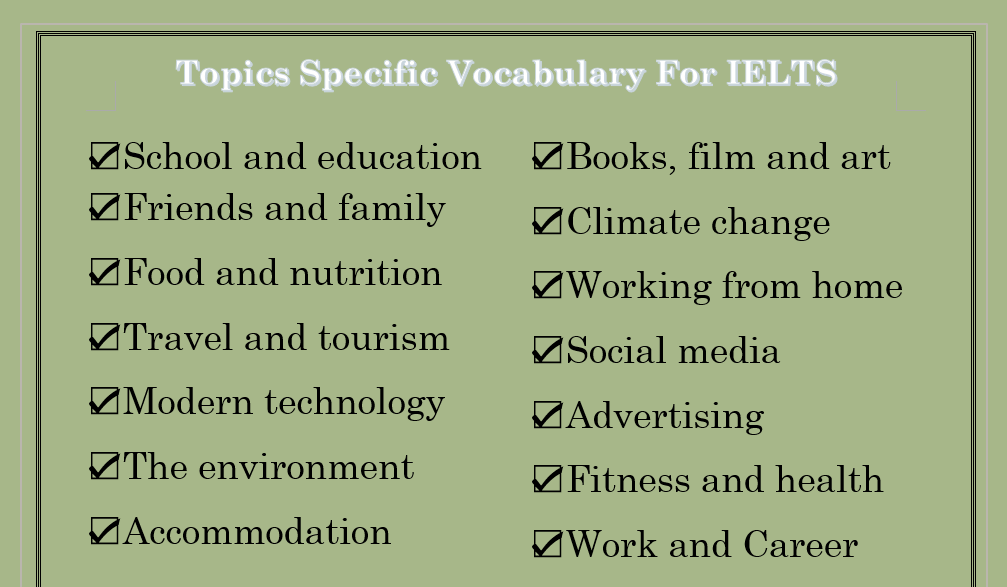IELTS試験で使われる単語は非常に多く、必要な単語数は6,000~12,000語と言われています。
これだけ多くの単語を覚えるにはかなりの時間と労力を要し、モチベーションの維持も難しくなります。
この記事では、効率的に学習するために、IELTSリスニングでよく使われる頻出単語を紹介していきます。
知っておくべき頻出単語
IELTSの試験では、どのセクションにおいても語彙力を高めることが必要不可欠です。
語彙力が不足していると、次の理由でスコア獲得が難しくなってしまいます。
- 問題文や選択肢の内容がわからない
- 音声や試験官が話している内容を理解できない
- ライティングやスピーキングで、自分の伝えたいことが表現できない
IELTS試験の単語数
IELTS試験で必要な英単語は、6,000~12,000語と言われ、非常に多くの単語を学習しなければなりません。
特に、IELTSで高得点を取得するためには、単語の意味とスペルだけでなく、正しい発音も理解する必要があります。
「毎日10個ずつ単語を覚える」など目標を立てて学習することが理想ですが、数が多く時間がかかるため、モチベーションの維持も大変です。
頻出単語を押さえておく
効率的に単語を学ぶためには、各セクションでよく使われる頻出単語に注目しましょう。
頻出単語は、試験本番でも出題される頻度が高いため、優先的に覚えるように意識しましょう。
ここではリスニングの頻出単語を紹介しますが、他セクションについては、次の記事で紹介しています。






パート1の頻出単語
リスニングセクションのパート1は、他のパートに比べて難易度が低いため、確実にスコアを獲得しましょう。
音声の内容は、電話での問い合わせなど基本的な日常会話です。選択問題と穴埋め問題が出題されます。
出題される単語は身近なものになりますが、穴埋め問題ではスペルミスに気を付けましょう。
名詞
パート1の名詞は曜日や月など、基本的な単語が多いですが、スペルミスが非常に多い単語群です。
大文字、小文字も採点対象になるため、まずは紙に書いて理解度を把握していきましょう。
曜日・月・季節
月名は、”r” と “l” を混合させないこと、季節名は、小文字で書くことに気を付けましょう。
| カテゴリー | 単語群 |
|---|---|
| 曜日 | Sunday Monday Tuesday Wednesday Thursday Friday Saturday |
| 月 | January February March April May June July August September October November December |
| 季節 | winter spring autumn summer |
図形
図形は、「Times Square」のように、固有名詞としても使われる場合もあります。
| カテゴリー | 単語群 |
|---|---|
| 図形 | circle(円) square(正方形) rectangle(長方形) triangle(三角形) cylinder(円柱) oval(楕円形) |
数字・時間・通貨
パート1では、数字を使った問題はよく出題されますが、数字もスペルミスが起こりやすいです。
解答時は、アルファベットではなく、アラビア数字(1,2,3…)を使うことで、スペルミス防止になります。
One hundred ninety-nine dollars → $199
また、発音の似ている単語は、聞き間違えないように注意して聞きましょう。
- 15(fifteen)
- 50(fifty)
発音の似ている単語や聞き間違いの多い単語は、ネット検索などで発音を調べ、聞き比べながら確認しましょう。
色
色自体を示す単語は、「Colour」と「color」の2つのスペルが存在します。
これらは、アメリカ英語かイギリス英語かの違いで、どちらも正解なので、覚えやすい方を使用しましょう。
| カテゴリー | 単語群 |
|---|---|
| 色 | red(赤) orange(オレンジ) yellow(黄色) green(緑) blue(青) purple(紫) white(白) black(黒) brown(茶色) |
動詞
解答に動詞を使用する場合は、時制には気を付けて記述しましょう。
| 動詞 | 意味 |
|---|---|
| suggest | 提案する |
| develop | 開発する |
| borrow | 借りる |
| persuade | 説得する |
| discuss | 議論する |
| review | 見直す |
| concentrate | 集中する |
| crash | 衝突する |
| cost | 費用がかかる |
| provide | 提供する |
| book | 予約する |
形容詞
| 形容詞 | 意味 |
|---|---|
| beautiful | 美しい |
| necessary | 必要な |
| fantastic | 素晴らしい |
| comfortable | 快適な |
| convenient | 便利な |
| wonderful | 素敵な |
| terrible | 酷い |
| temporary | 一時的な |
| permanent | 永久的な |
| knowledgeable | 知識がある |
| various | 様々な |
| exciting | 刺激的な |
| boring | 退屈な |
| difficult | 難しい |
| easy | 簡単な |
例題
▼スクリプト
Shirley: Hello?
Tom: Oh hello. I was hoping to speak to Jack Fitzgerald about renting a cottage.
Shirley: I’m his wife, Shirley, and we own the cottages together, so I’m sure I can help you.
Tom: Great. My name’s Tom. Some friends of ours rented Granary Cottage from you last year, and they thought it was great. So my wife and I are hoping to come in May for a week.
Shirley: What date did you have in mind?
Tom: The week beginning the 14th, if possible.
Shirley: I’ll just check … I’m sorry, Tom, it’s already booked that week. It’s free the week beginning the 28th, though, for seven nights. In fact, that’s the only time you could have it in May.
Tom: Oh. Well, we could manage that, I think. We’d just need to change a couple of things. How much would it cost?
Shirley: That’s the beginning of high season, so it’d be £550 for the week.
Tom: Ah. That’s a bit more than we wanted to pay, I’m afraid. We’ve budgeted up to £500 for accommodation.
Shirley: Well, we’ve just finished converting another building into a cottage, which we’re calling Chervil Cottage.
Tom: Sorry? What was that again?
Shirley: Chervil. C-H-E-R-V for Victor, I-L.
Tom: Oh, that’s a herb, isn’t it?
Shirley: That’s right. It grows fairly wild around here. You could have that for the week you want for £480.
Tom: OK. So could you tell me something about it, please?
Shirley: Of course. The building was built as a garage. It’s a little smaller than Granary Cottage.
Tom: So that must sleep two people, as well?
Shirley: That’s right. There’s a double bedroom.
Tom: Does it have a garden?
Shirley: Yes. you get to it from the living room through French doors, and we provide two deckchairs. We hope to build a patio in the near future, but I wouldn’t like to guarantee it’ll be finished by May.
Tom: OK.
Shirley: The front door opens onto the old farmyard, and parking isn’t a problem – there’s plenty of room at the front for that. There are some trees and potted plants there.
パート2の頻出単語
パート2では、1人のスピーカーによる日常的なスピーチが行われます。
出題形式は、選択問題やマッチング問題、地図問題と様々なパターンがあります。
特に地図問題では、方角や場所を説明する単語がよく使われるので、ぜひ押さえておきましょう。
名詞
施設
| 単語 | 意味 |
|---|---|
| kitchen | キッチン |
| bathroom | 浴室・お手洗い |
| bedroom | 寝室 |
| living room | リビング |
| dining room | 食堂 |
| lounge | ラウンジ |
| library | 図書館 |
| gymnasium (gym) | ジム |
| reception | 受付 |
| ticket desk | 券売所 |
| storage room | 倉庫 |
| theatre | 劇場 |
| museum | 博物館 |
| canteen | 食堂 |
方向・位置
地図問題では、方角は「上下左右」ではなく、「東西南北」を使用して解答するように気を付けましょう。
| 単語 | 意味 |
|---|---|
| North | 北 |
| South | 南 |
| East | 東 |
| West | 西 |
| straight | 真っすぐ |
| across from ~ | ~の向かいに |
| diagonal | 対角線 |
| corner | 角 |
| opposite | 反対 |
| adjacent to ~ | ~に隣接した |
| near | 近く |
| bend | カーブ |
場所・物
| 単語 | 意味 |
|---|---|
| tennis court | テニスコート |
| courtyard | 中庭 |
| laboratory | 実験室 |
| road | 道 |
| path | 小道 |
| traffic lights | 信号機 |
| bench | ベンチ |
| swimming pool | スイミングプール |
| garden | 庭 |
| bookshop | 書店 |
| kindergarten | 幼稚園 |
| castle | 城 |
| parliament | 国会・議会 |
| car park | 駐車場 |
動詞
| 単語 | 意味 |
|---|---|
| turn | 回転させる・方向を変える |
| move | 動く |
| ontinue on | 進み続ける |
| walk | 歩く |
| cross | 渡る・横断する |
| pass | 通る・通過する |
| end | 終わる |
| stop | 止まる |
| go straight ahead | 真っすぐに進む・直進する |
例題


▼スクリプト
OK, let me tell you about some of the changes that have been made – and some things that have been retained. If you look at this map, you’ll see the familiar outline of the park, with the river forming the northern boundary, and a gate in each of the other three walls. The statue of Diane Gosforth has been moved: it used to be close to the south gate, but it’s now immediately to the north of the lily pond, almost in the centre of the park, which makes it much more visible.
There’s a new area of wooden sculptures, which are on the river bank, where the path from the east gate makes a sharp bend. There are two areas that are particularly intended for children. The playground has been enlarged and improved, and that’s between the river and the path that leads from the pond to the river. Then there’s a new maze, a circular series of paths, separated by low hedges. That’s near the west gate – you go north from there towards the river and then turn left to reach it.
There have been tennis courts in the park for many years, and they’ve been doubled, from four to eight. They’re still in the south-west corner of the park, where there’s a right-angle bend in the path. Something else I’d like to mention is the new fitness area. This is right next to the lily pond on the same side as the west gate.
Now, as you’re all gardeners, I’m sure you’ll like to hear about the plants that have been chosen for the park.
パート3の頻出単語
パート3の音声では、大学のグループ課題に関して、数人で話し合う会話が流れます。
セクション3では、内容がアカデミックになり、扱う単語も難しくなるため、アカデミック用語の語彙が必要です。
最低でも、ここで紹介する頻出単語は覚えておくことが理想です。
名詞
学校に関する用語
| 単語 | 意味 |
|---|---|
| university | 大学・総合大学 |
| college | 大学・単科大学 |
| presentation | プレゼンテーション |
| project | プロジェクト |
| pairs | ペア |
| organisation | 組織 |
| outline | 概要 |
| proofreading | 校正 |
| deadline | 締め切り |
| commencement | 開始 |
| experiment | 実験 |
| reference | 参照 |
| lecture | 講義 |
| tutor | 家庭教師・個別指導教員 |
| attendance | 出席 |
| specialist | 専門家 |
| knowledge | 知識 |
| faculty | 学部 |
| bachelor’s | 学士 |
| master’s | 博士 |
| schedule | スケジュール |
| management | 管理 |
| leadership | リーダーシップ |
| questionnaire | アンケート |
| statistic | 統計 |
| assessment | 評価 |
| revision | 改訂 |
| pass | 合格 |
| fail | 不合格 |
| supervise | 監督者 |
| assess | 評価する |
| degree | 学位 |
| certificate | 修了証書 |
教科
| 単語 | 意味 |
|---|---|
| Mathematics (Maths) | 数学 |
| Science | 科学 |
| English | 英語 |
| Physical Education (PE) | 体育 |
| Art | 美術 |
| Music | 音楽 |
| Geography | 地理 |
| Biology | 生物 |
| Chemistry | 科学 |
| History | 歴史 |
専攻科目
| 単語 | 意味 |
|---|---|
| Commerce | 商業学 |
| Psychology | 心理学 |
| Engineering | 工学 |
| Sociology | 社会学 |
| Medicine | 薬学 |
| Architecture | 建築学 |
| Law | 法学 |
| Philosophy | 哲学 |
| Economics | 経済学 |
| Education | 教育学 |
| Archaeology | 考古学 |
| Literature | 文学 |
| Agriculture | 農学 |
| Anthropology | 人類学 |
例題
Assignment plan
Decide on research question:
Is there a relationship between hours of sleep and number of dreams?
Decide on the sample:
Twelve students from the 25………………………..department
Decide on methodology:
Self-reporting
Decide on procedure:
Answers on 26 ………………………….
Check ethical guidelines for working with 27…………………………….
Ensure that risk is assessed and 28 …………………………is kept to a minimum
Answer the results
Calculate the correlation and make a 29 ………………………………
30 …………………………………the research
▼スクリプト
Susie: So shall we plan what we have to do for this assignment?
Luke: OK.
Susie: First, we have to decide on our research question. So how about ‘Is there a relationship between hours of sleep and number of dreams?’
Luke: OK. Then we need to think about who we’ll do the study on. About 12 people?
Susie: Right. And shall we use other psychology students?
Luke: Let’s use people from a different department. What about history?
Susie: Yes, they might have interesting dreams! Or literature students?
Luke: I don’t really know any.
Susie: OK, forget that idea. Then we have to think about our methodology. So we could use observation, but that doesn’t seem appropriate.
Luke: No. It needs to be self-reporting I think. And we could ask them to answer questions online.
Susie: But in this case, paper might be better as they’ll be doing it straight after they wake up … in fact while they’re still half-asleep.
Luke: Right. And we’ll have to check the ethical guidelines for this sort of research.
Susie: Mm, because our experiment involves humans, so there are special regulations.
Luke: Yes, I had a look at those for another assignment I did. There’s a whole section on risk assessment, and another section on making sure they aren’t put under any unnecessary stress.
Susie: Let’s hope they don’t have any bad dreams!
Luke: Yeah.
Susie: Then when we’ve collected all our data we have to analyse it and calculate the correlation between our two variables, that’s time sleeping and number of dreams and then present our results visually in a graph.
Luke: Right. And the final thing is to think about our research and evaluate it. So that seems quite straightforward.
Susie: Yeah. So now let’s …
パート4の頻出単語
パート4は、IELTSリスニングの中で最も難易度が高いパートと言われています。
音声の内容は、1人のスピーカーによるレクチャーです。
グループ会話と異なり、音声をよく聞いて、話の過程を追っていく必要があります。
出題される分野も幅広いため、頻出単語の量も多くなりますが、しっかりと覚えて試験に活かしましょう。
頻出単語
健康
| 単語 | 意味 |
|---|---|
| 名詞 | |
| vegetarian | 菜食主義者 |
| vegan | 完全菜食主義者 |
| leisure | 余暇 |
| disease | 病気 |
| food pyramid | 食物ピラミッド |
| vitamin | ビタミン |
| protein | タンパク質 |
| carbohydrates | 炭水化物 |
| exercise | 運動 |
| treatment | 治療 |
| remedy | 治療薬 |
| obese | 肥満 |
| check up | 健康診断 |
| medicine | 薬 |
| pandemic | 世界的大流行 |
| virus | ウイルス |
| vaccination | 予防接種 |
| 動詞 | |
| cure | 治療する |
| 形容詞 | |
| healthy | 健康な |
| overweight | 太り過ぎの |
| fit | ふさわしい・健康な |
動物と生息環境
| 単語 | 意味 |
|---|---|
| mammals | 哺乳類 |
| reptile | 爬虫類 |
| primates | 霊長類 |
| predators | 捕食者 |
| prey | 獲物 |
| island | 島 |
| pond | 沼 |
| stream | 小川 |
| endangered | 絶滅危惧種 |
| species | 種類 |
環境、災害
| 単語 | 意味 |
|---|---|
| global warming | 地球温暖化 |
| disaster | 災害 |
| earthquake | 地震 |
| tornado | 竜巻 |
| blizzard | 猛吹雪 |
| hurricane | 台風 |
| pollution | 汚染 |
| temperature | 温度 |
| drought | 干ばつ |
| flood | 洪水 |
| cyclone | 低気圧 |
| volcanic eruption | 火山噴火 |
| deforestation | 森林伐採 |
| desertification | 砂漠化 |
| bush fires | 山火事 |
| erosion | 浸食 |
政治
| 単語 | 意味 |
|---|---|
| politics | 政治 |
| government | 政府 |
| leader | 指導者 |
| politician | 政治家 |
| senator | 上院議員 |
| mayor | 市長 |
| regulations | 規則 |
| senate | 上院 |
| president | 大統領 |
| society | 社会 |
| individual | 個人 |
| council | 地方議会 |
エネルギー
| 単語 | 意味 |
|---|---|
| nuclear | 核 |
| coal | 石炭 |
| hydro electrical power | 水力発電 |
| natural gas | 天然ガス |
| solar power | 太陽光発電 |
| source | 元・源 |
| generate | 発電 |
| electricity | 電気・電力 |
| dam | ダム |
| windmill | 風車 |
| wind turbine | 風力原動機 |
| renewable | 再生可能な |
| non-renewable | 再生不可能な |
その他の頻出単語
| 単語 | 意味 |
|---|---|
| appointment | 予約 |
| cooperation | 協力 |
| employment | 雇用 |
| exhibition | 展示 |
| occupation | 職業 |
| century | 世紀 *100年 |
| decade | 10年 |
| millennium | 1,000年 |
| creativity | 創造性 |
| guarantee | 保証 |
| satellite | 衛星 |
| opportunity | 機会 |
| licence | 免許 |
| frequently | 頻繁に |
例題
The Eucalyptus Tree in Australia
Importance
・it provides 31……………….. and food for a wide range of species
・its leaves provide 32………….. which is used to make a disinfectant
Reasons for present decline in number
A) Diseases
(i) “Mundulla Yellows”
・Cause – Lime used for making 33…………… was absorbed
– trees were unable to take in necessary iron through their roots
(ii) “Bell-miner Associated Die-back”
・Cause – 34 ……………………….. feed on eucalyptus leaves
– they secrete a substance containing sugar
– bell-miner birds are attracted by this and keep away other species
▼スクリプト
Today I’m going to talk about the eucalyptus tree. This is a very common tree here in Australia, where it’s also sometimes called the gum tree. First I’m going to talk about why it’s important, then I’m going to describe some problems it faces at present.
Right, well the eucalyptus tree is an important tree for lots of reasons. For example, it gives shelter to creatures like birds and bats, and these and other species also depend on it for food, particularly the nectar from its flowers.
So it supports biodiversity. It’s useful to us humans too, because we can kill germs with a disinfectant made from oil extracted from eucalyptus leaves.
The eucalyptus grows all over Australia and the trees can live for up to four hundred years. So it’s alarming that all across the country, numbers of eucalyptus are falling because the trees are dying off prematurely.
So what are the reasons for this? One possible reason is disease. As far back as the 1970s the trees started getting a disease called Mundulla Yellows.
The trees’ leaves would gradually turn yellow, then the tree would die. It wasn’t until 2004 that they found the cause of the problem was lime, or calcium hydroxide to give it its proper chemical name, which was being used in the construction of roads.
The lime was being washed away into the ground and affecting the roots of the eucalyptus trees nearby. What is was doing was preventing the trees from sucking up the iron they needed for healthy growth. When this was injected back into the affected trees, they immediately recovered.
But this problem only affected a relatively small number of trees. By 2000, huge numbers of eucalyptus were dying along Australia’s East Coast, of a disease known as Bell-miner Associated Die-back.
The bell-miner is a bird, and the disease seems to be common where there are high populations of bell-miners. Again it’s the leaves of the trees that are affected. What happens is that insects settle on the leaves and eat their way round them, destroying them as they go, and at the same time they secrete a solution which has sugar in it.
The bell-miner birds really like this solution, and in order to get as much as possible, they keep away other creatures that might try to get it. So these birds and insects flourish at the expense of other species, and eventually so much damage is done to the leaves that the tree dies.
IELTSリスニング頻出単語のまとめ
IELTSでは、語彙力が非常に重要になります。
試験で使われる単語は非常に多いため、まずは頻出単語から学習を進める方法がおすすめです。
IELTSのリスニングは、セクション数が進むにつれて、内容がアカデミックなり、難易度が上がります。
空欄の穴埋めを行う問題では、大文字、小文字も含めた単語のスペルミスに気を付けましょう。
セクション別特化対策にも対応



